Lord of the World
 | |
| Author | Robert Hugh Benson |
|---|---|
| Country | United Kingdom |
| Language | English |
| Genre | Dystopian novel |
| Publisher | Dodd, Mead and Company |
Publication date | 1908 |
| Media type | Print (hardcover) |
| Pages | 352 pp |
Lord of the World is a 1907[1] novel by Monsignor Robert Hugh Benson that centers upon the reign of the Anti-Christ and the End of the World. It has been called prophetic by Dale Ahlquist, Joseph Pearce, Pope Benedict XVI and Pope Francis.[2]
Inception

According to his biographer, Fr. Cyril Martindale, Mgr. Benson's depiction of the future was in many ways an inversion of the science fiction novels of H. G. Wells. In particular, Benson was sickened by Wells' belief that Atheism, secular humanism, Freemasonry, anarchism, Marxism, radical feminism, Eco-terrorism, nihilism, World Government, and Eugenics would lead to an earthly utopia. Due to his depiction of a Wellsian future as a global police state, Benson's novel has been called one of the first modern works of dystopian fiction.
Also according to Fr. Martindale, the "guiding hand" in Benson's writing was that of his friend and literary mentor Frederick Rolfe. Rolfe's anti-Modernist satirical novel Hadrian VII influenced numerous aspects of Lord of the World, including the introductory first chapter.[3]
Writing during the pontificate of Pope Pius X and prior to the First World War, Monsignor Benson accurately predicted interstate highways, weapons of mass destruction, and passenger air travel in an advanced form of Zeppelin called the "volor". However, he also presumed the survival of the British Empire and predominant travel by rail. Like many other Catholics of the era in which he wrote, Monsignor Benson shares the political and economic views of G. K. Chesterton and Hilaire Belloc.
Synopsis
Prologue
In early 21st century London, two priests, the white-haired Father Percy Franklin and the younger Father John Francis, are visiting the subterranean lodgings of the elderly Mr. Templeton. A Catholic and former Tory who witnessed the marginalization of his religion and the destruction of his Party, Mr. Templeton describes to the two priests the last century of British and world history.
Since the Labour Party took control of the British Government in 1917, the House of Lords has been abolished, the British Royal Family has been deposed, Oxford and Cambridge have been closed down and all their professors exiled to Ireland. Marxism and Secular Humanism, which are described as the instruments of Freemasonry,[4] dominate both culture and government. The Anglican Communion has been disestablished since 1929 and, like all forms of Protestantism, is almost extinct. The world now has only three main religious forces: Catholicism, Secular Humanism, and "the Eastern religions."[5]
Nationalism has been destroyed by Marxist internationalism and the world has been divided into three power-blocs. The first, which is generally marked in red on maps, is an European Confederation of Marxist one-party states and their colonies in Africa that use Esperanto for a world language. The second, marked in yellow, is "The Eastern Empire", whose Emperor, the "Son of Heaven", descends from both the Japanese and Chinese Imperial Families. The third, the blue marked, "The American Republic", consists of North, South, and Central America.
In a move that almost toppled Marxism in the Confederation during the 1970s and '80s, the Eastern Empire invaded, annexed, and now rules India, Australia, New Zealand, as well as all of Russia east of the Ural Mountains. For this and other reasons, Mr. Templeton explains, the Confederation and the Eastern Empire are now on the brink of a global war.[6]
After Mr. Templeton completes his story, Fathers Franklin and Francis return to their spartan apartments at Westminster Cathedral.
Book I: The Advent
_Ramsay_MacDonald_by_Solomon_Joseph_Solomon.jpg)
Oliver Brand, an influential Communist MP from Croydon, listens as his secretary, Mr. Phillips, describes the seemingly inevitable rush toward war between the Confederation and the Empire. He mentions that Julian Felsenburgh, a Senator from Vermont who looks identical to Father Percy Franklin, has unexpectedly taken charge of the American Republic's peace delegation. Felseburgh is tirelessly crisscrossing Asia and Siberia, delivering speeches to rapt audiences. In conversation with his wife, Mabel, Oliver comments that war between the Confederation and the Empire will be "Armageddon with a vengeance", and expresses hope that Senator Felsenburgh will save the day. Although Mabel Brand appears concerned, her husband responds, "My dear, you must not be downhearted. It may pass as it all passed before. It is a great thing that we are listening to America at all. And this Mr. Felsenburgh seems to be on the right side."[7]
Over breakfast, Oliver frets about his upcoming trip to Birmingham, where the outraged population is again demanding the right to trade freely with the American Republic. As his mind returns to the possible war against the Empire, Brand ponders that the real problem is the survival of religious belief in the Eastern Empire—Buddhism, Islam, Sufism, Confucianism, and Pantheism. In Great Britain, only Catholicism remains in "a few darkened churches" and "with hysterical sentimentality" in Westminster Cathedral. He ponders with disgust how, against his opposition, Ireland was granted Home Rule and "opted for Catholicism." Furthermore, the city of Rome was "given up wholly" to Pope John XXIV, who has transformed it into a Hong Kong-style enclave where "mediaeval darkness" reigns supreme. He recalls with outrage how the Italian Republic was forced to move its capital to Turin. As he departs to catch a volor to Birmingham, Oliver looks out at "the grey haze of London, really beautiful, this vast hive of men and women who had learned at least the primary lesson of the gospel that there was no God but man, no priest but the politician, and no prophet but the schoolmaster."[8]
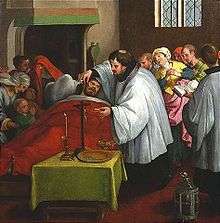
As she prepares to board a train to Brighton, Mabel Brand witnesses a Government volor crash into the station. As the Government's Ministers of Euthanasia arrive and begin to finish off the wounded, maimed, and dying, Mrs. Brand witnesses Father Percy Franklin arrive. She is stunned to see the priest open his coat, pull out his crucifix, and give the Last Rites to the dying Catholic lying next to her. After she returns home, deeply moved and traumatized by what she has witnessed, Mabel tell Oliver that both Father Franklin and the dying man seemed to believe in what they were doing.
While deeply grieved that his wife has witnessed the horrors of the accident, Oliver explains Catholic doctrine about the Afterlife, which he mocks as a ridiculous belief that a person's mind can survive despite their brain being dead. According to Brand, for Father Franklin, the soul of the man is either "in a sort of smelting works being burned", or if "that piece of wood took effect" he is "somewhere beyond the clouds" with the Holy Trinity, the Mother of God, and the Communion of Saints. He explains that, "that kind of thing may be nice, but it isn't true." Impressed by her husband's explanation of the fallacy of religion, Mabel relaxes.[9]
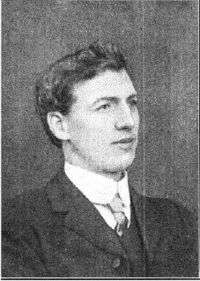
At the residence of the Cardinal-Protector near Westminster Cathedral, Father Percy Franklin finishes writing his Latin language report to Rome about the mass defections taking place among English Catholics. As he walks toward the elevator, Father Franklin finds that Father John Francis, whom he has been attempting to nurse through his mounting doubts, has lost his faith and decided to leave the priesthood. In a last ditch effort to prevent this, Father Franklin explains that Christianity "may be untrue", but it cannot be absurd and false as long as educated and intelligent people continue to believe in its teachings. Unmoved, Father Francis rebuffs Father Franklin's argument and, with bottomless self-pity, asks whether they can remain friends. Father Franklin, suspecting that Father Francis is now a police informant, responds, "What kind of friends could we be?" An infuriated Fr. Francis leaves in a huff.[10]
After saying his prayers before the Eucharist in the Tabernacle, Father Franklin joins his fellow priests as they discuss Felsenburgh over dinner. Later, as he ponders the disintegration of Catholicism throughout the world, Father Franklin decides that what the Church needs most is a new religious order, which will help the Faith to survive and spread in the catacombs.[11]
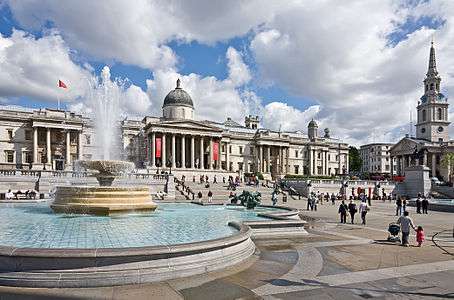
While giving a speech at Trafalgar Square, Oliver Brand is wounded in the arm by a Catholic layman armed with a pistol. After the would-be assassin is beaten to death by the assembled crowd, Oliver informs Mabel of the news. Senator Felsenburgh is now said to have supplanted the Son of Heaven as the ruler of the Eastern Empire, which he has been crisscrossing to deliver his speeches. Even so, Oliver explains that he must travel to Paris to prepare armaments for expected war. He explains that an explosives manufacturer named Benninschein has developed weapons of mass destruction and sold them to both power blocs. Therefore, a war will leave at least one power bloc completely annihilated.[12]
Hours later, a glowing Oliver returns from Paris and tells Mabel that, due to Felsenburgh, all chances of war have evaporated. It will soon be announced, and Oliver urges Mabel to come with him at once. Felsenburgh, he explains, will be there.[13]
As the Brands depart for their meeting with Felsenburgh, Oliver's secretary, Mr. Phillips arrives at the flat of Father Percy Franklin. Explaining that Oliver Brand's elderly mother used to be a Catholic, Phillips explains that she wishes to return to the Church before her imminent death. Although he knows it might be a set up, Father Franklin feels that he cannot refuse. After having what he expects to be his last confession heard, he walks to London Victoria Station to catch a train to Croydon. To his shock, Father Franklin encounters cheering crowds and electrified letters announcing the overthrow of the Eastern Empire by Felsenburgh, the calling off of the expected war, the establishment of "universal brotherhood", and Felsenburgh's imminent arrival in London. After secretly arriving at the Brands' home, he is met by Mrs. Brand and, realizing that she is completely sincere, he receives her back into the Catholic Church.[14]
Moments later, the doorknob opens, revealing that the Brands have returned home an hour earlier than expected. Enraged that a priest would visit his home, Oliver is utterly infuriated that his mother would actually request such a thing. Despite his outraged demands, Father Franklin refuses to reveal who acted as the go-between. To Oliver's shock, Mabel urges Father Franklin to leave in peace. She explains that he will see Felsenburgh and the overflowing joy that his arrival has occasioned in England. This is why, Mabel explains, she is not longer afraid of him or of others like him. Deeply surprised that he will not be arrested, Father Franklin leaves into the summer night.[15]
As he returns to Victoria Station, Father Franklin encounters a rally being addressed by Senator Felsenburgh. For a brief moment, the Senator's hypnotic powers of persuasion cause the priest to believe in him, but Father Franklin's doubts about the Catholic Faith are soon overcome.[16]
Book II: The Encounter

As Oliver Brand reads Mabel an account of Felsenburgh's arrival in England in the Marxist newspaper New People, it is revealed that the Senator, who speaks all languages with equal fluency, has been hailed as the Mahdi throughout the Islamic World. It boasts that his background has nothing "that convicts him of sin", in contrast to the corrupt practices that have "made the sister continent what she is today".[17]
It adds, however, "Of his actual words we have nothing to say. So far as we are aware, no reporter made notes at the moment; but the speech, delivered in Esperanto, was a very simple one; and very short. It consisted of a brief announcement of the great fact of Universal Brotherhood, a congratulation to all who were yet as live to witness this consummation of history; and at the end, an ascription of praise to the Spirit of the World whose incarnation was now accomplished."[18]
The article proceeds to mock the supernatural as dead. It announces that a new and enlightened age has come and that mankind is finally ready for world peace.[19]
Meanwhile, as her son is away with Felsenburgh, Mrs. Brand takes a sudden turn for the worse. Ignoring Mabel's sermons about how Christianity has divided the Human Race and caused nothing but terrible violence, Mrs. Brand pleads for Father Franklin to be summoned. When Oliver returns home that day, a weeping Mabel informs him that his mother died an hour before. Clutching her rosary, Mrs. Brand had continued to scream for a priest as long as she was able to speak. Mabel explains, however, that she had had her mother-in-law involuntarily euthanised, knowing that her husband would desire it. Although moved to tears by his mother's passing, Oliver tells Mabel that she did the right thing.[20]
Meanwhile, Father Franklin, who has been summoned to Rome by Pope John XXIV, arrives in Paris to board a volor connection to Italy. As he waits at the main volor station in the former Basilica of the Sacred Heart in Montmartre, Father Franklin ponders how the England that he is leaving behind is beginning to resemble an earthly Hell. Upon his arrival in Rome, Father Franklin is greeted by the Cardinal Protector of England and informed that the Pope will receive him at eleven o'clock.[21]
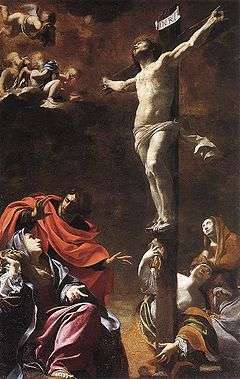
Upon being shown into the presence of His Holiness, Father Franklin explains his ideas for the Church's survival under the rule of Julian Felsenburgh. The answer must be increasing standardization and centralization. Father Franklin therefore recommends the forced merging of all religious orders, the abolition of the Eastern Catholic Churches, and the forced residence of all members of the College of Cardinals in Rome. He further argues that violence must never be used – the Mass and the rosary must by the primary weapon against the coming persecution.[22] In conclusion, Father Franklin recommends the forming of a new religious order, with no habit or badge, "freer than the Jesuits, poorer than the Franciscans, more mortified than the Carthusians: men and women alike -- the three vows for their Church; each Bishop responsible for their sustenance; a lieutenant in each country... And Christ Crucified for their patron."[23]
After the audience, Father Franklin is assigned as an assistant to the ailing Cardinal Protector of England. His duties are to offer daily Mass in the Cardinal's Oratory and to read and summarize all reports from England. During his free hours, Father Franklin takes long walks through the city. He ponders how the Eternal City, which the Pope has divided into four national quarters, now represents a microcosm of the world.[24]
Towards the end of August, as Father Franklin walks toward the celebration of the Pope's Name Day, he passes the yoked carriages of the deposed Crowned Heads of Europe. As he recognizes the British Royal Family, the German House of Hohenzollern, the House of Romanov, the Spanish and French Houses of Bourbon, and scores of "lesser powers", Father Franklin ponders the "appalling danger" their presence constitutes "in a democratic world." The world, he knows, affects "to laugh at the desperate play-acting of Divine Right on the part of fallen and despised families", but he shudders to think what could happen if that sentiment ever turns to anger.[25]
Half an hour later, Father Franklin follows the Pope in a procession through the streets of Rome and ponders the contrast between the Church and the World. "The two Cities of Augustine lay for him to choose. The one was that of a world self-originated, self-organized and self sufficient, interpreted by such men as Marx and Herve, socialists, materialists, and, in the end, hedonists, summed up at last by Felsenburgh. The other lay displayed in the sight he saw before him, telling of a Creator and of a creation, of a Divine purpose, a redemption, and a world transcendent and eternal from which all sprang and moved. Of the two, John and Julian, was the Vicar, and the other the Ape, of God... And Percy's heart in one more spasm of conviction made its choice..."[26]
As the Pope, the College of Cardinals, and the deposed royals assemble in the Vatican, Father Franklin's heart quickens as he watches the Papal Mass that follows, in which the former monarchs serve the Pope at the Altar.[27]
As Pope John Elevates the Host, Father Franklin ponders that here lies the one hope of the world's dwindling Catholics, "as mighty and little as once within the manger. There was none other that fought for them but only God." He realizes that if God cannot be moved from His silence by the persecution of the Faithful, how could He not respond to the reenactment of His Son's Passion and Death, which pleads now within an "island of Faith amid a sea of laughter and hatred"?[28]
After the Mass, as an exhausted Father Franklin finally sits down, the heartbroken Cardinal-Protector of England arrives and informs him that Julian Felsenburgh is now President of Europe. As they examine the dispatches late into the night, it soon becomes clear that the news is true. After each of the Great Powers offered him the Presidency and was repeatedly refused, a Convention of Powers offered Felsenburgh a unified proposal. Felsenburgh was to "assume a position hitherto undreamed of in democracy"—a House of Government in every Capital, a final veto lasting three years on every motion submitted to him, legal power granted to every motion he submits on three consecutive years, and the title President of Europe.[29]
The narration reads, "...all this, Percy saw very well, involved the danger of a unified Europe increased tenfold. It involved all of the stupendous force of Socialism directed by a brilliant individual. It was a combination of the strongest characteristics of the two methods of Government. The offer had been accepted by Felsenburgh after eight hours silence."[29]
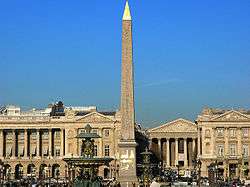
Tossing and turning through a sleepless night, Father Franklin ponders "the madness that had seized upon the nations; the amazing stories that had poured in that day of the men in Paris, Who, raving like Bacchantes, had stripped themselves naked in the Place de la Concorde, and stabbed themselves to the heart, crying to thunders of applause that life was too enthralling to be endured... of the crucifixion of the Catholics that morning in the Pyrenees, and the apostasy of three bishops in Germany..." Heartsick, Father Franklin ponders how God can make no sign and speak no word.[30]
As morning breaks, the Cardinal-Protector arrives and announces that he is terminally ill. When he dies, Pope John has decided that it will be Father Franklin who will succeed him.
The following day, Father Franklin arrives for a Papal Allocution. Fully expecting Pope John to issue another Anathema against both Marxism and Freemasonry—the ideological pillars of Felsenburgh's new order—Father Franklin is stunned as the Pope instead announces that he is creating an Order of Christ Crucified to spread the Faith on the face of persecution.[31]
Meanwhile, President Felsenburgh has instructed the Parliaments of Europe to institute weekly Humanist ceremonies, inspired by the rituals of Freemasonry,[32] in all the cathedrals and churches which are not in Catholic hands. Attendance is to be optional except for the four annual festivals of Maternity, Life, Sustenance, and Paternity. Those who refuse to attend are threatened with dire consequences.[33]
As Oliver Brand, now Minister of Public Worship,[34] plans the upcoming festival of the Maternity with ex-priest John Francis, he learns to his dismay that the Cardinal-Protector of England has died and that Father Percy Franklin has taken his place.[35] In conversation with Mabel, Oliver expresses contempt for the Pope's new religious order and calls it the most foolish thing the Church could ever have done.[36]
Meanwhile, in Rome, Cardinal Franklin arrives at his offices and reads reports of the new Humanist rituals. He recalls with dismay that John Francis was only recently offering the Mass at Catholic Altars. He ponders that Felsenburgh's rituals are "Positivism of a kind, Catholicism without Christianity, Humanity worship without its inadequacy."[37]
With a deep sense of pessimism, the Cardinal recalls the outrage which these decrees have caused among the world's Catholics and how, in a recent Audience, he and Cardinal Hans Steinmann of Germany urged Pope John to issue "a stringent decree... forbidding acts of violence on the part of Catholics." The faithful are to be encouraged to be patient, to quietly avoid Humanist worship, to say nothing unless arrested and questioned, and to gladly suffer persecution for Christ's sake.[38] As the Pope considers their proposal, Cardinal Franklin learns that Mr. Phillips—Oliver Brand's now disgraced Secretary—urgently wishes to see him. He gives orders that Mr. Phillips is to arrive in January.[39]
As Advent proceeds to Christmas, Cardinal Franklin witnesses the new Order of Christ Crucified go forward "with almost miraculous success." Practically the entirety of Rome has enrolled, including the deposed monarchs. From throughout the world, long lists arrive of new member drawn up by their Bishops,[40] "...but better than all this was the tidings of victory in another sphere. In Paris forty of the new-born Order had been burned alive in one day in the Latin Quarter, before the Government intervened. From Spain, Holland, and Russia had come in other names. In Düsseldorf, eighteen men and boys, surprised at the singing of Prime in the Church of St. Lawrence, had been cast down one by one into the city sewer, each chanting as he vanished: Christi Fili Dei vivi miserere nobis, and from the darkness had come the same broken song until it was silenced with stones. Meanwhile, German prisons were thronged with the first batches of recusants. The world shrugged its shoulders, and declared that they had brought it on themselves, while it yet deprecated mob violence, and requested the attention of the authorities and the decisive repression of this new conspiracy of superstition. And within St. Peter's Church the workmen were busy at the long rows of new altars, affixing to the stone diptychs the brass-forged names of those who had already fulfilled their vows and gained their crowns. It was the first word of God's reply to the world's challenge."[41]
When Mr. Phillips arrives in Rome on New Year's Day, his news horrifies Cardinal Franklin—English and German Catholics are plotting a suicide bombing against the Abbey where Felsenburgh's inner circle meets. Horrified, Cardinal Franklin informs Pope John, who immediately dispatches him and the Cardinal Steinmann of Germany, to their respective homelands to try to prevent the bombing. As their volor flies over the Alps, the two Cardinals encounter an enormous squadron of volors heading south from England and Germany. Having also learned of the plot through Mr. Phillips, President Felsenburgh has ordered the Dresden-style destruction of Rome in retaliation.[42]

Using Benninschein's new explosives, the Anglo-German volors systematically firebomb the entire city of Rome, killing Pope John, all the assembled Cardinals, and countless unarmed men, women, and children. Meanwhile, news of the plot triggers anti-Christian pogroms to spread throughout the world. In London, Mabel Brand witnesses mobs of militant Atheists crucifying Christian men, women, and children and lynching priests before her very doors. Having believed that only religious belief could incite such violence, Mabel's faith in Felsenburgh is left deeply shaken.
Upon his return home, Oliver Brand attempts to console his wife. He explains that the pogrom has happened because the people of England have not yet been purged from the residue of Christianity. When Mabel asks why the riots were not obstructed by the police, however, Brand admits that the police have been ordered to stand down. Although she admits that she has been contemplating suicide, Mabel relaxes when informed that Felsenburgh will soon be arriving. Oliver reminds her, ominously, that it is over. Rome has already been destroyed and that he co-signed the orders. Devastated, Mabel dissolves in tears.[43]

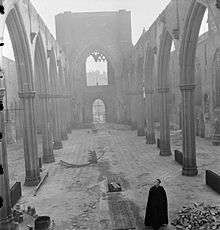
The following day, Oliver Brand reads news reports of the riots. According to the Marxist newspaper New People, Westminster Cathedral has been sacked and every altar overthrown. A priest managed to consume the Eucharist moments before being seized and throttled. The Archbishop, two bishops, and eleven priests have been lynched in the sanctuary. Thirty-five convents have been destroyed and St George's Cathedral, Southwark has been burned to the ground. It is alleged that for the first time since the introduction of Christianity to England that there is not a single functioning church.[44]
That afternoon, the Brands and all the people of London enter St. Paul's Cathedral for the Feast of Maternity, over which Felsenburgh will preside. After procession with incense and a few opening remarks by turncoat Mr. John Francis, Felsenburgh enters the Cathedral dressed in the red and black robes of a British High Court judge. As the crowd listens with rapt admiration, Felseburgh speaks of the destruction of Rome and the recent pogroms against Christians. He explains that future generations of men must flush with shame to remember that mankind had once turned its back on the risen light.

Then, a curtain is torn aside, revealing a statue of a naked mother and child. Felsenburgh leads all the assembled worshipers in prayer to the "Mother of us all." All those present hail the statue as Queen and Mother. The chapter ends with the words, "Then in the heavenly light, to the crash of drums, above the screaming of the women and the battering of feet, in one thunder peal of worship ten thousand voices hailed Him Lord and God."[45]
Book III: The Victory

In a dusty hovel in the Palestinian town of Nazareth, Cardinal Franklin—now Pope Sylvester III[46]—carefully reads a biography of Felsenburgh in order to understand the mind of his opponent. As his mind wanders, he remembers how it all came to this.
After the destruction of Rome, Cardinals Franklin and Steinmann traveled to the deathbed of the only other survivor of the College of Cardinals—the Latin Patriarch of Jerusalem—and held an impromptu Papal Conclave.
The dying Patriarch argued that President Felsenburgh and Cardinal Franklin look identical because they are the antithesis of each other. In response, Cardinal Franklin was elected as Pope Sylvester III. Soon after, the Latin Patriarch died and Cardinal Steinmann returned to Berlin, where he was promptly lynched during a pogrom.
Pope Sylvester has since reorganized the Church so that it will survive the global persecution under Felsenburgh's Government. He has secretly rebuilt the College of Cardinals, but his actual name and location are known only to the members of the College. He continues, however, to communicate with them by clandestine messenger and by radio.
Meanwhile, Felsenburgh has ordered the Test Act—all the world's people must either formally disavow the existence of God or be executed without trial. While large numbers of religious believers and agnostics refuse and are slaughtered, many others agree without any qualms.
With the last remnant of her faith shattered, Mabel Brand secretly leaves her husband and checks into a voluntary euthanasia clinic. All of Oliver's attempts to find her are in vain. After the eight-day waiting period required by law, Mabel is led inside a gas chamber, voluntarily turns it on, and suffocates herself. As her life fades away, Mabel finds, "something resembling sound or light, something she knew in an instant to be unique, tear across her vision. Then she saw, and understood..."[47]
At a subsequent meeting of the British Cabinet, President Felsenburgh arrives. He remains silent as his plans are relayed by his assistant. Due to an informer—Cardinal Dolgorovski of Moscow—the President has learned that there is a new Pope. He is the former Cardinal Percy Franklin, who has somehow survived the destruction of Rome. He, and the remaining Cardinals, are now in a secret meeting in Nazareth. The President demands their assent to a volor-bombing attack to wipe out the city and its inhabitants. Explaining that Cardinal Dolgorovski has now outlived his usefulness, the assistant explains that he will be executed to prevent him from taking over the remnants of the Roman Catholic Church. Oliver Brand and the cabinet give the President their unanimous assent.
In Nazareth, Pope Sylvester is told that Cardinal Dolgorovski has refused a direct order to attend. After listening to those who have spoken with him, the Pope realizes that Dolgorovski has been turned, has given everything up, and that Nazareth is about to be destroyed like Rome. He gives orders to warn the city's residents to flee, and then, trusting in divine intervention, Pope Sylvester offers Mass followed by Eucharistic Adoration.
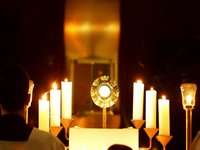
As Felsenburgh personally flies in the volor-squadron, the narration states, "He was coming now, swifter than ever, the heir of temporal ages and exile of eternity, the final piteous Prince of rebels, the creature against God, blinder than the sun which paled and the earth which shook; and, as He came, passing even then through the last material stage to the thinness of a spirit fabric, the floating circle swirled behind Him, tossing like phantom birds in the wake of a phantom ship... He was coming, and the earth, rent once again in its allegiance, shrank and reeled in the agony of divided homage..."[48]
As volor firebombs begin to rain down on Nazareth, Pope Sylvester and the Cardinals calmly continue to chant the Tantum Ergo before a Host exposed in a Monstrance on the altar. Literally describing a deus ex machina, the last words of the novel are: "Then this world passed, and the glory of it."[49]
Influences
Monsignor Benson was also influenced by his reading of history—specifically the anti-Catholic persecutions that followed the English Reformation and the French Revolution. A scene in which President Felsenburgh leads an enormous congregation in the worship of a nude female statue in St. Paul's Cathedral is a less lascivious version of the worship of the Goddess of Reason inside Notre Dame Cathedral in 1793. The number of former priests and bishops who willingly collaborate with this cult are inspired by the French clergymen who rejected Papal authority and became State employees following the Civil Constitution of the Clergy.
The abortive conspiracy to blow up the Anti-Christ and the grisly aftermath are inspired by the Gunpowder Plot of 1605, in which a small group of English Catholic laymen led by Robert Catesby planned to blow up King James I of England during a session of Parliament. Like its fictional counterpart, the Gunpowder Plot touched off a campaign to completely and permanently destroy Roman Catholicism.
Further inspiration was gleaned from Benson's following of current events — Anti-Jewish pogroms in the Russian Empire, the Russian Revolution of 1905, the Rev. Evan Roberts and the Evangelical revival meetings in Wales, and the socialist Labour Party's creating and success during the 1906 general election.
Composition
According to his biographer Fr. Cyril Martindale, Monsignor Benson conceived Lord of the World while assigned as a Catholic Chaplain at Cambridge University.
Benson first mentioned his ideas in a letter to his mother on 16 December 1905, "Yes, Russia is ghastly. Which reminds me that I have an idea for a book so vast and tremendous that I daren't think about it. Have you ever heard of Saint-Simon? Well, mix up Saint-Simon, Russia breaking loose, Napoleon, Evan Roberts, the Pope and Antichrist; and see if any idea suggests itself. But I'm afraid it is too big. I should like to form a syndicate on it, but that is an idea, I have no doubt at all."[50]
In a letter to his close friend and literary mentor Frederick Rolfe on 19 January 1906, Benson wrote, "Anti-Christ is beginning to obsess me. If it is ever written, it will be a BOOK. How much do you know about the Freemasons? Socialism? I am going to avoid scientific developments, and confine myself to social. This election seems to hold vast possibilities in the direction of Anti-Christ's Incarnation -- I think he will be born of a virgin. Oh! If I dare to write all that I think! In any case, it will take years."[51]
According to Father Martindale, the gradual evolution of Lord of the World can be charted through three of Monsignor Benson's notebooks. The first two reveal that Benson based President Felsenburgh on "a rather prominent socialist politician" whose name Father Martindale does not disclose. Felsenburgh's leadership style, however, was modeled on that of Napoleon Bonaparte. In his second notebook, Benson wrote of Felsenburgh, "He never forgives: for political crime he strips of position, making the man incapable of holding office; for treachery to himself he drops them out of his councils." He further described the Anti-Christ as, "complete hardness, and kindness".[3]

On 16 May 1906, Benson wrote in his diary, "Anti-Christ is going forward; and Rome is about to be destroyed. Oh, it is hard to keep it up! It seems to me that I am getting terser and terser until finally the entire story will end in a gap, like a stream disappearing in sand. It is such a fearful lot that one might say, that every word seems irrelevant."[52]
On 28 June 1906, Benson again wrote in his diary, "I HAVE FINISHED ANTI-CHRIST. And really there is no more to be said. Of course I am nervous about the last chapter -- it is what one may call just a trifle ambitious to describe the End of the World. (No!) But it has been done."[53]
In a 28 January 1907 letter, Lord of the World was praised by Frederick Rolfe. Commenting on Benson's decision to satirize him as "Chris Dell" in The Sentimentalists, Rolfe wrote, "You are worrying yourself most unnecessarily about me, I assure you... I am laughing at the absurdity of the whole thing though I must confess that I was rather amazed when I heard that everybody recognized me in Chris. It was rather a blow to my amour propre... You will, I hope, reap a rich harvest of shekels from the transaction, and the world will forget The Sentimentalists when it stands wondering before The Lord of the World."[54]
Textual error in modern editions
Most modern editions of Lord of the World contain an error in Book III, Chapter Five, Section III, carried forward from a printer's error in the American edition of the book. A sentence in the second paragraph of Section III began as follows, in the British first edition:
“In short, it seemed that he could do no good by remaining in England, and the temptation to be present at the final act of justice in the East by which those who had indirectly been the cause of his tragedy were to be wiped out…”
In the corrupted text found in most modern editions, the passage reads (erroneous portion in italics):
"In short, it seemed that he could do no good by remaining in England, and the temptation to be present at the final act of justice in the East by which land, and, in fact, it was more than likely that if she were to be wiped out…”
Legacy
Catholic intellectuals
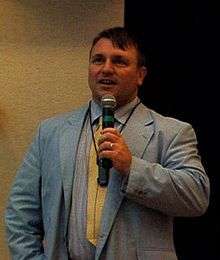
Although it is not as well known as the dystopian writings of Evgeny Zamyatin, George Orwell, and Aldous Huxley, Lord of the World continues to have many admirers—especially among Conservative and Traditionalist Catholics. Despite the novel's subtle contempt for "Greek Christianity",[55] Mother Catherine Abrikosova, an Eastern Rite Catholic Dominican nun and future victim of the Gulag, translated Lord of the World into the Russian language shortly before the October Revolution of 1917.[56]
In a 2005 essay, Joseph Pearce wrote that, while Orwell and Huxley's novels are "great literature", they "are clearly inferior works of prophecy." Pearce explains that while "the political dictatorships" that inspired Huxley and Orwell "have had their day", "Benson's novel-nightmare ...is coming true before our very eyes."[57]
Pearce elaborates,
The world depicted in Lord of the World is one where creeping secularism and godless humanism have triumphed over traditional morality. It is a world where philosophical relativism has triumphed over objectivity; a world where, in the name of tolerance, religious doctrine is not tolerated. It is a world where euthanasia is practiced widely and religion hardly practiced at all. The lord of this nightmare world is a benign-looking politician intent on power in the name of "peace", and intent on the destruction of religion in the name of "truth". In such a world, only a small and shrinking Church stands resolutely against the demonic "Lord of the World".[58]
EWTN talk show host and American Chesterton Society President Dale Ahlquist has also praised Monsignor Benson's novel and said that it deserves a wider audience.[59]
Michael D. O'Brien's has cited it as an influence on his Apocalyptic series Children of the Last Days.
Papal Statements
On February 8, 1992, Cardinal Joseph Ratzinger criticized U. S. President George H. W. Bush's recent speech calling for "a New World Order" in a speech of his own at the Università Cattolica del Sacro Cuore. In his discourse, the future Pope explained that Monsignor Benson's novel described "a similar unified civilization and its power to destroy the spirit. The anti-Christ is represented as the great carrier of peace in a similar new world order."[60]
Cardinal Ratzinger proceeded to quote from Pope Benedict XV's 1920 encyclical Bonum sane: "The coming of a world state is longed for, by all the worst and most distorted elements. This state, based on the principles of absolute equality of men and a community of possessions, would banish all national loyalties. In it no acknowledgement would be made of the authority of a father over his children, or of God over human society. If these ideas are put into practice, there will inevitably follow a reign of unheard-of terror."[60]
In a sermon in November, 2013, Pope Francis praised Lord of the World as depicting, "the spirit of the world which leads to apostasy almost as if it were a prophecy."[2]
In early 2015, Pope Francis further revealed Benson's influence upon his thinking by telling a plane load of reporters. At first apologizing for making "a commercial", Pope Francis further praised Lord of the World, despite its being "a bit heavy at the beginning". Pope Francis elaborated, "It is a book that, at that time, the writer had seen this drama of ideological colonization and wrote that book... I advise you to read it. Reading it, you'll understand well what I mean by ideological colonization."[61]
References
- ↑ Robert Hugh Benson, Lord of the World, London. Sir Isaac Pitman and Sons Ltd. 1907.
- 1 2 Pope Francis Denounces "Adolescent Progressivism" Calls "Lord of the World" Prophetic, Catholic News Service, November 19, 2013.
- 1 2 Martindale (1916) Volume 2. pp. 68-69.
- ↑ Benson, Lord of the World, Saint Augustine's Press, 2011. Page 3.
- ↑ Benson (2011), page 7.
- ↑ In the European and Asian power blocs and their prevention from going to war by the intervention of the Anti-Christ, Lord of the World is very similar to "A Short Tale of the Anti-Christ", written in 1900 by Vladimir Solovyov. There is no evidence, however, that Monsignor Benson was in any way influenced by or even aware of Solovyov.
- ↑ Benson (2011), page 19.
- ↑ Benson (2011), pages 19-22
- ↑ Benson (2011), pages 22-25.
- ↑ Benson (2011), pages 28-33.
- ↑ Benson (2011), pages 37-41.
- ↑ Benson (2011), pages 44-52.
- ↑ Benson (2011), pages 52-56.
- ↑ Benson (2011), pages 58-68.
- ↑ Benson (2011), pages 69-74.
- ↑ Benson (2011), pages 74-78.
- ↑ Benson (2011), pages 79-81.
- ↑ Benson (2011), pages 81-82.
- ↑ Benson (2011), pages 82-84.
- ↑ Benson (2011), pages 87-93.
- ↑ Benson (2011), pages 94-107.
- ↑ Benson (2011), pages 106-110.
- ↑ Benson (2011), page 110.
- ↑ Benson (2011), pages 111-112.
- ↑ Benson (2011), pages 113-114.
- ↑ Benson (2011), page 115.
- ↑ Benson (2011), pages 115-116.
- ↑ Benson (2011), page 116.
- 1 2 Benson (2011), page 117.
- ↑ Benson (2011), page 120.
- ↑ Benson (2011), pages 122-128.
- ↑ Benson (2011), page 137.
- ↑ Benson (2011), pages 133-135, 136-140.
- ↑ Benson (2011), page 136.
- ↑ Benson (2011), pages 129-133.
- ↑ Benson (2011), pages 140-141.
- ↑ Benson (2011), pages 143-144.
- ↑ Benson (2011), pages 144-145.
- ↑ Benson (2011), pages 145-146.
- ↑ Benson (2011), pages 147-149.
- ↑ Benson (2011), pages 149-150.
- ↑ Benson (2011), pages 152-166.
- ↑ Benson (2011), pages 167-176.
- ↑ Benson (2011), pages 177-178.
- ↑ Benson (2011), page 189.
- ↑ When Lord of the World was published in 1907, the Antipopes Alexander V and John XXIII were seen as validly elected Roman Pontiffs. Therefore, Monsignor Benson's Pope John is "XXIV" rather than "XXIII". As Pope Silvester III was then seen as an Antipope, Monsignor Benson's Pope Silvester is "III" rather than "IV".
- ↑ Benson (2011), page 236.
- ↑ Benson (2011), page 259.
- ↑ Benson (2011), page 260.
- ↑ C.C. Martindale, S.J. (1916), The Life Of Monsignor Robert Hugh Benson, Volume 2, Longmans, Green and Co, London. pp. 65-66.
- ↑ Martindale (1916), Volume 2, page 66.
- ↑ Martindale (1916), Volume 2, page 73.
- ↑ Martindale (1916), Volume 2, page 75.
- ↑ Martindale (1916), Volume 2, page 57.
- ↑ Benson (2011), page 195.
- ↑ Kathleen West, The Regular Tertiaries of St. Dominic in Red Moscow, Blackfriars, June 1925. pp. 322-327.
- ↑ Pearce (2005), Literary Giants, Literary Catholics, page 141.
- ↑ Pearce (2005), page 141.
- ↑ Dale Ahlquist (May 2011). "A surprising book about the end of the world, but we know that the world ends" (PDF). The Catholic Servant. p. 12.
- 1 2 "Who is Joseph Ratzinger? A biography of the new Pope". Michael (334). April 2005. p. 16.
- ↑ Alan Holdren (January 19, 2015). "Full text of Pope's in-flight interview from Manila to Rome". Catholic News Agency.
Further reading
- Ahlquist, Dale (2012). "The End of the World," The American Chesterton Society, March 12.
- Bleiler, Everett (1948). The Checklist of Fantastic Literature. Chicago: Shasta Publishers. p. 48.
- Cuddy, Denis L. (2005). "Lord of the World," News with Views, April 20.
- Martindale, C.C. (1916). The Life of Monsignor Robert Hugh Benson, Vol. 2. London: Longmans, Green & Co.
- McCloskey, Fr. John. "Introduction to Benson's 'Lord of the World'," Catholic City, [n.d.].
- Rutler, Fr. George W. (2008). "The One We Were Waiting For," National Review, November 3.
- Schall, Rev. James V. (2012). "The Lord of the World," Crisis Magazine, July 10.
- Wood. Joseph (2009). "Lord of the World," The Catholic Thing, March 31.
External links
- "Lord of the World", Ex Fontibus Co., 2015. ISBN 978-1507790502
- "Lord of the World", St. Augustine's Press, 2001. ISBN 1-890318-38-8
- "Lord of the World" complete text online at Authorama.com - public domain books
- "Lord of the World" complete text from Project Gutenberg.
- "Lord of the World", Dood, Mead & Company, 1908 1917, from Internet Archive.
- "Lord of the World", Isaac Pitman & Sons, 1918, from Hathi Trust.
-
 Lord of the World public domain audiobook at LibriVox
Lord of the World public domain audiobook at LibriVox - "Lord of the World", YouTube film - free of copyright.


.jpg)